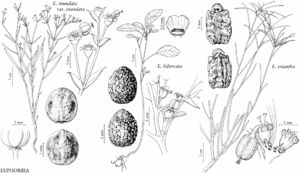Difference between revisions of "Euphorbia bifurcata"
in W. H. Emory, Rep. U.S. Mex. Bound. 2(1): 190. 1859.
FNA>Volume Importer |
imported>Volume Importer |
||
| (One intermediate revision by the same user not shown) | |||
| Line 1: | Line 1: | ||
{{Treatment/ID | {{Treatment/ID | ||
|accepted_name=Euphorbia bifurcata | |accepted_name=Euphorbia bifurcata | ||
| − | |accepted_authority=Engelmann | + | |accepted_authority=Engelmann |
|publications={{Treatment/Publication | |publications={{Treatment/Publication | ||
| − | |title=Rep. U.S. Mex. Bound. | + | |title=in W. H. Emory, Rep. U.S. Mex. Bound. |
|place=2(1): 190. 1859 | |place=2(1): 190. 1859 | ||
|year=1859 | |year=1859 | ||
| Line 37: | Line 37: | ||
-->{{#Taxon: | -->{{#Taxon: | ||
name=Euphorbia bifurcata | name=Euphorbia bifurcata | ||
| − | |authority=Engelmann | + | |authority=Engelmann |
|rank=species | |rank=species | ||
|parent rank=section | |parent rank=section | ||
| Line 48: | Line 48: | ||
|distribution=N.Mex.;Tex.;Mexico;Central America (Guatemala). | |distribution=N.Mex.;Tex.;Mexico;Central America (Guatemala). | ||
|reference=None | |reference=None | ||
| − | |publication title=Rep. U.S. Mex. Bound. | + | |publication title=in W. H. Emory, Rep. U.S. Mex. Bound. |
|publication year=1859 | |publication year=1859 | ||
|special status=Illustrated | |special status=Illustrated | ||
| − | |source xml=https:// | + | |source xml=https://bitbucket.org/aafc-mbb/fna-data-curation/src/2e0870ddd59836b60bcf96646a41e87ea5a5943a/coarse_grained_fna_xml/V12/V12_702.xml |
|genus=Euphorbia | |genus=Euphorbia | ||
|section=Euphorbia sect. Poinsettia | |section=Euphorbia sect. Poinsettia | ||
Latest revision as of 19:17, 5 November 2020
Herbs, annual, with slender, fibrous taproot. Stems erect, 20–70 cm, glabrous or with few scattered spreading hairs; branches arcuate, branching appearing dichotomous. Leaves usually alternate, occasionally opposite at proximalmost node; petiole 15–49 mm, glabrous; blade usually ovate, rarely oblong or elliptic, 13–54 × 7–38 mm, base usually rounded to broadly cuneate, rarely truncate, margins finely serrulate, apex obtuse, surfaces glabrous or with few scattered hairs; venation pinnate, midvein prominent. Cyathial arrangement: terminal dichasial branches 2, few-branched (weakly defined); pleiochasial bracts 2–3, opposite or whorled, wholly green, similar in shape and size to distal leaves; dichasial bracts smaller than distal leaves, often white at base. Cyathia: peduncle 0.9–3.5(–6.2) mm. Involucre tubular or obconic, 1–1.7 × 0.7–1.4 mm, glabrous except for few hairs on lobes; involucral lobes divided into several linear, smooth lobes; glands 1(–3), greenish, sessile and broadly attached, 0.3–0.4 × 0.4–0.8 mm, opening oblong to subcircular, glabrous; appendages petaloid, white, elliptic, oblong, transversely oblong, or forming thin, lunate rim on gland margin, not incurved and covering glands, 0.3–0.9 × 0.6–1.3 mm, entire, undulate or slightly lobed, glabrous. Staminate flowers 20–30. Pistillate flowers: ovary glabrous; styles 0.6–1 mm, 2-fid 1/2 length. Capsules oblate, 2.8–3.1 × 3.6–4.5 mm, glabrous; columella 1.9–2.4 mm. Seeds brown to blackish, ovoid, rounded in cross section, 1.9–2.4 × 1.5–1.8 mm, irregularly and coarsely tuberculate; caruncle absent or rudimentary.
Phenology: Flowering and fruiting summer–fall.
Habitat: Riparian areas with cottonwoods and willows, pinyon pine woodlands, pine-oak forests, Douglas fir forests with pines.
Elevation: 1900–2300 m.
Distribution

N.Mex., Tex., Mexico, Central America (Guatemala).
Discussion
Euphorbia bifurcata is found in the mountains of southern New Mexico (Doña Ana, Grant, Lincoln, Otero, and Sierra counties) and trans-Pecos Texas (Brewster, Jeff Davis, and Presidio counties).
Selected References
None.
